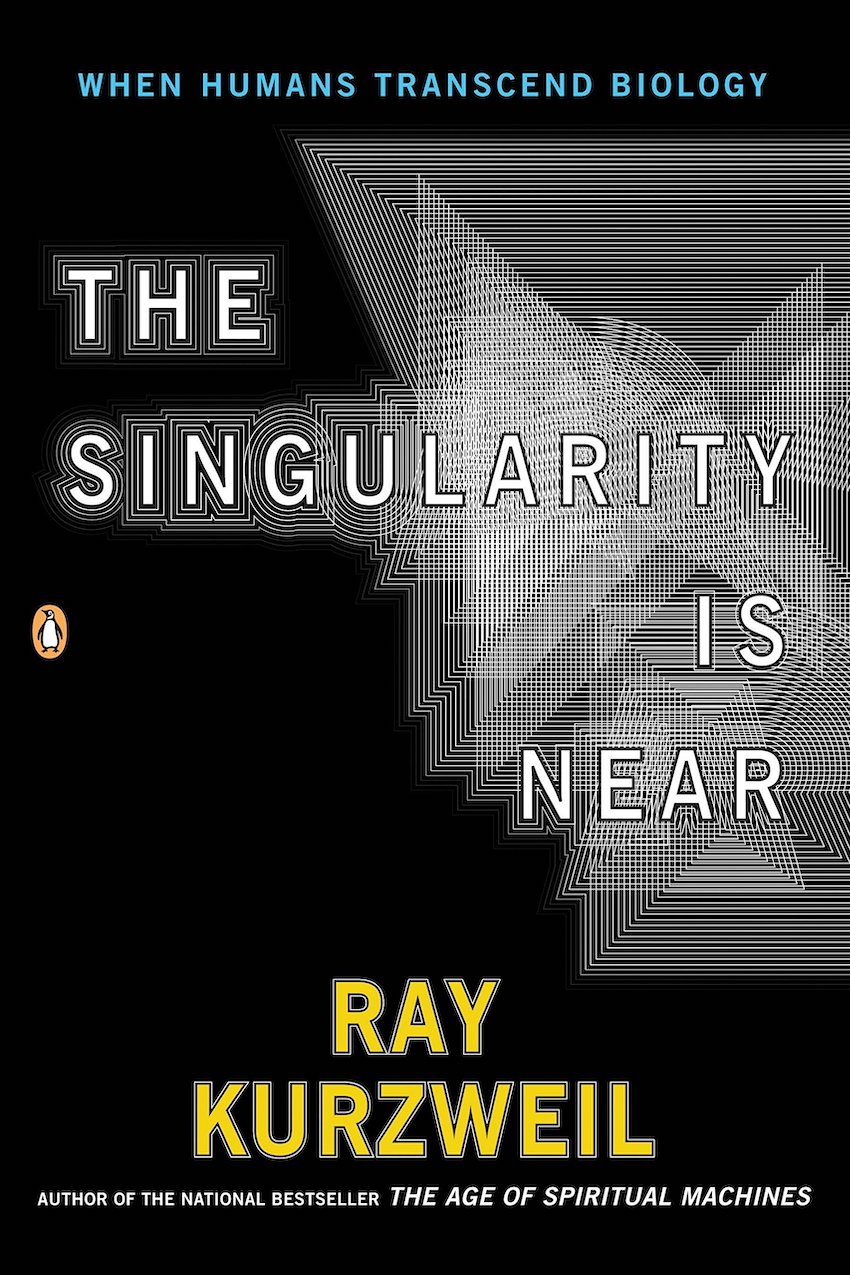A Critique against hoaxing of Ray Kurtzweil's "Technological Singularity"


カーツワイル批判序説
A Critique against hoaxing of Ray Kurtzweil's "Technological Singularity"


解説:池田光穂
【カーツワイル批判】(→「シンギュラリティ批判序説」)
シンギュラリティ=技術的特異点(Technological Singularity, Singularity)という用語は「レイ・カーツワイル(Ray Kurzweil, 1948- ) によれば、「100兆の極端に遅い結合(シナプス)しかない人間の脳の限界を、人間と機械が統合された文明によって超越する」瞬間」が訪れるという、技術 論的終末論のことである。カーツワイルは、この終末論を展開するにあたり、人類のテクノロジーやコンピュータチップの計算効率の進化などを博引旁証して、 仔細に検討しているために、なぜ100兆という情報のノードが脳のシナプス結合と類推されるのか、また、それよりも低次の(例えば原索動物やイカなどの人 間よりも低次の)シナプス結合の総量しかもたない動物のふるまいを完全に模倣できるのかという議論などをしておらず、あくまでもシナプス結合が思考を構成 するという「シナプス結合総計中心主義」であることがわかる。そのため、カーツワイル氏には、全地球システムのICTがシンギュラリティを超えて、全地球 システムがはたして、我々と同じように「思考」しているかどうかということについては、我々は相変わらずシナプスレベル(=デカルトの確信レベルとしての「機械の中の幽霊」)でしか 「把握」できないというジレンマを抱えることを御存知ないわけである。さらに、人間とICT端末のハリブリッドな利用、つまりサイボーグ化により、我々は すでにシンギュラリティを超えて、すでに人間=機械状態(ドゥルーズとガタリの用語)になっていることは「ただ、単に知らない」だけなのかもしれない。
 |
第1章 六つのエポック 第2章 テクノロジー進化の理論—収穫加速の法則 第3章 人間の脳のコンピューティング能力を実現する 第4章 人間の知能のソフトウェアを実現する—人間の脳のリバースエンジニアリング 第5章 衝撃… 第6章 わたしは技術的特異点論者だ |
【シンギュラリティ到来に関する相対主義的な新仮説】
計算効率が大脳のそれを凌駕する条件をシンギュラリティと呼ぶ。その時点は計算量の進歩だけで予言されてきた。しかし人間とりわけ学生の短 絡思考化=馬鹿化により前倒しになる点を、従来のシンギュラリティは考慮に入れなかった。ゆえにこれは理論計算上の誤りであった。以上QED
【ユニテリアンで鍛えた少年時代の宗教多元主義】
「ホロコーストから逃れてきたわたしの両親は、いずれも芸術家で、子どもには、実際的で視野の広い 宗教教育を施したいと考えた。それでわたしは、ユニテリアン派教会の教えを受けることになった。そ こでは、半年かけてひとつの宗教について学ぶ。礼拝に出て、教典を読み、指導者と対話する。それが 終わると、次の宗教について勉強する。「真理に至る道はたくさんある」という考え方がその中心にあ るのだ。世界中の宗教の伝統には共通するところがたくさんあるが、一致しないところも明らかにある ことに当然気づいた。おおもとの真実は奥が深くて、見かけの矛盾を超えることができるのだというこ とが、だんだんとわかってきた」(カーツワイル 2007:4-5)。
【シンギュラリティ時代に登場する、自分の脳の情報をアップロードする方法[妄想?]の登場】
Navin Bondade, n.d., Elon Musk’s AI project to replicate the human brain receives $1 billion from Microsoft https://techgrabyte.com/elon-musks-ai-1-billion-microsoft/
●シ ンギュラリティ主義は、形而上学的実在論(metaphysical realism)であるという点から批判する
ヒラリー・パットナムが、「桶の中の脳」を批判したように、それはシンギュラリティを懐疑論
としてみなして批判することではなく、形而上学的リアリズム(実在論)を批判することもできる。形
而上学的実在論とは次の説明による:"Metaphysical
realism maintains that "whatever exists does so, and has the properties
and relations it does, independently of deriving its existence or
nature from being thought of or experienced."" - Laird Addis, Greg
Jesson, Erwin Tegtmeier (eds.), Ontology and Analysis: Essays and
Recollections about Gustav Bergmann, Walter de Gruyter, 2007, p. 107.
特異点(シンギュラリティ)論 者カーツワイルによる脳がコンピュータと異なる点は以下のように表 される。
"Singularitarianism(シンギュラリティ主義) is a movement defined by the belief that a technological singularity—the creation of superintelligence—will likely happen in the medium future, and that deliberate action ought to be taken to ensure that the singularity [can] benefit humans." - Singularitarianism. Lev Grossman, 2045: The Year Man Becomes Immortal: We're fast approaching the moment when humans and machines merge. Welcome to the Singularity movement, Time, Thursday, Feb. 10, 2011.
■脳が(従来の)コンピュータと異 なる点(カーツワイル 2007:175-180)
■ シンギュラリティ思想礼賛と「到来の時期の比定」への批判
【シンギュラリティを最初に予言したのはコンピューティングの父フォン・
ノイマンである】
シ ンギュラリティをレイ・カーツワイル(Ray Kurzweil, 1948- )[別項のパラグラフ参照]で表象するのは、AI思想の歴史を考えるときに根本的に誤解(=misrepreseuntation)を引き起こす。英国の 数学者、アーヴィング・ジョン・グッド(アイ・ジェイ= I. Jey, "Jack") (1916-2009)が1965年に書いた論文のなかに、「超高性能マシン」こそが人類の生き残りにかかると託宣めいた論文に書いたことがきっかけであ る。実際にグッドは、2001, Space Odyssey (1968) にコンサルタントとして関わっていた。科学とSFが出会う場所が、ボブ・グッチョーネ創刊による雑誌『オムニ』(Omni, 1978-1995) である。この雑誌において、SF作家、ヴァーナー・ヴィンジが、シンギュラリティ(特異点)と、グッドがいう、計算機による知能爆発を、こう呼んだのであ る。しかし、人口に膾炙した、この特異点のまえに、さらに重要なことがあることを私たちは忘れてはいけない。電子計算機(コンピュータ)の父[=ノイマン 型コンピュータ思想の父と呼ぶべきか]、フォン・ノイマン(Neumann Jáno; John von Neumann, Margittai Neumann János Lajos, Johannes Ludwig von Neumann, 1903-1957)こそが、その用語をつかって、予言めいた発言をしていたのである。
ジョ ン・フォン・ノイマンは、同僚であったスタニスラウ・ウラム(Stanislaw Ulam, 1909-1984) とかつて話している時に、人類は根本的な「シンギュラリティ」に達しており、その後の人間の世は永遠に変わってしまうと予言めいて話し手いたという。 (Ulam, S., 1958. John von Neumann, Bulletin of the American Mathematical Society 64(3, Part.2):1-49.)
■"Quite
aware that the criteria of value in mathematical work
are, to some extent, purely aesthetic, he once expressed an
apprehension that the values put on abstract scientific achievement in
our present civilization might diminish: "The interests of humanity may
change, the present curiosities in science may cease, and entirely
different things may occupy the human mind in the future." One
conversation centered on the ever accelerating progress of technology
and changes in the mode of human life, which gives the appearance of
approaching some essential singularity
in the history of the race beyond which human affairs, as we know them,
could not continue" (Ulam, 1958:5).
リンク
文献
その他の情報
++
Copyleft, CC,
Mitzub'ixi Quq Chi'j, 1996-2099